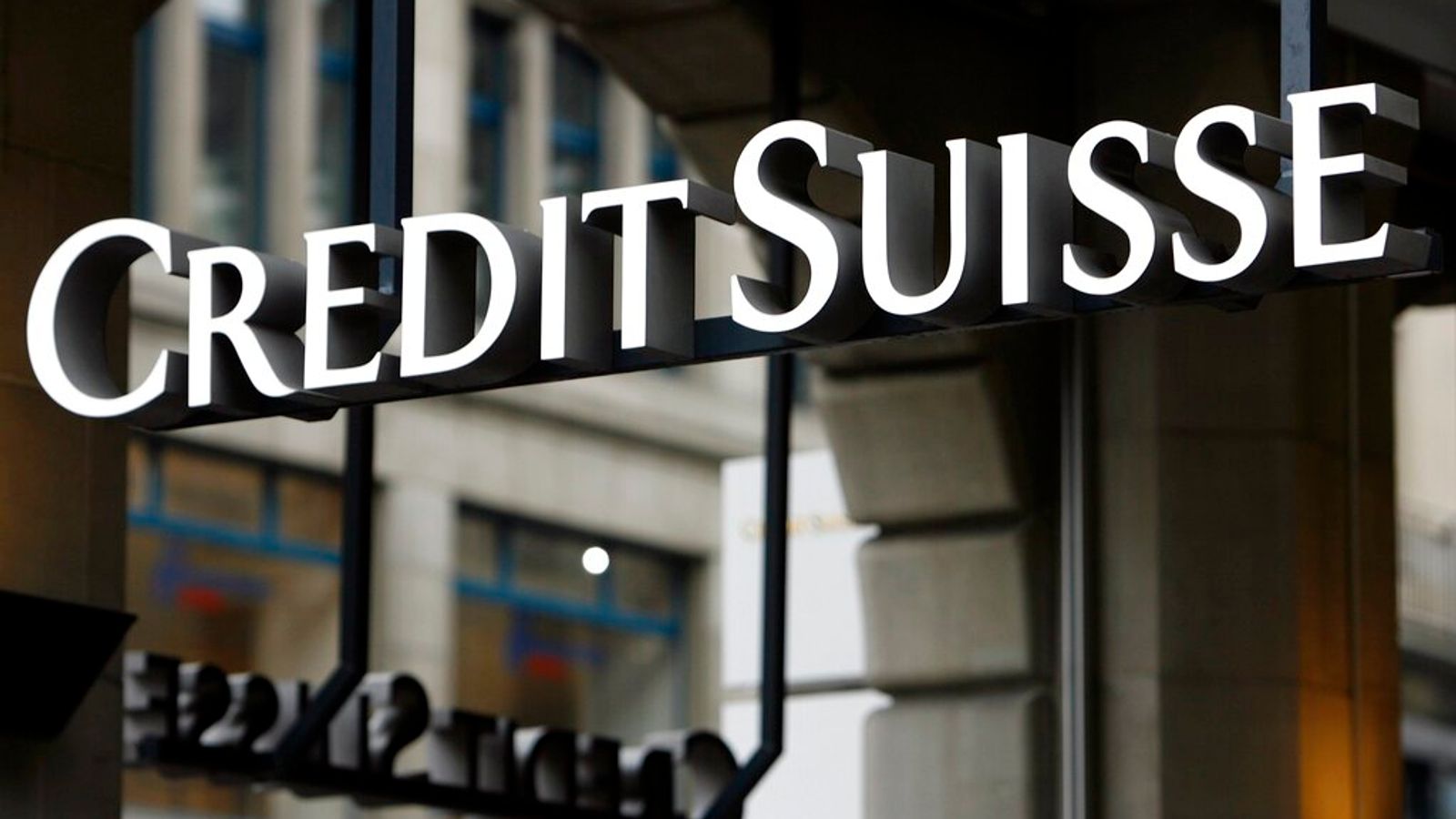FTSE 100 takes £75bn hit as Europe becomes new focus of Silicon Valley Bank fallout

The FTSE 100 and other major European stock markets have taken a beating as concern over the health of US banks crosses the Atlantic.
London’s blue chip index lost £75bn in combined market value by the close after suffering its deepest fall, on a points basis, since the early days of the COVID crisis.
Sentiment soured across the continent when the top shareholder at troubled Credit Suisse declared that it could not provide the Swiss bank with more financial assistance.
That sent its shares down by almost a third at one stage to new record lows and prompted a hit to wider financial stocks, market analysts said.
Switzerland’s second-largest bank, no stranger to crisis over the past few years, like others has seen concerns for its financial health come into sharper focus since the collapse of Silicon Valley Bank last week.
The attention of investors has mostly been on the ability of lenders to absorb the aggressive tightening of interest rates since last year which has made it more difficult to service their debts.
Budget 2023 – read more:
Politics live: Budget reaction
Economy will avoid recession, chancellor says
The key points of the budget at a glance
Adding to the early selling mood was speculation that the European Central Bank (ECB) planned to raise its core deposit rate by 0.5 percentage points this Thursday as part of its continued efforts to tackle inflation.
A source close to the ECB Governing Council said the ECB was unlikely to ditch plans for a big rate move this week because that would damage its credibility, the Reuters news agency reported.
Advertisement
Markets on Wednesday morning were pricing in a 90% chance of a 0.5 percentage point hike.
However, given the scale of the market mayhem facing financial services firms, the probability had dropped to 20% by late Wednesday afternoon.
Please use Chrome browser for a more accessible video player
2:36
Markets react to SVB collapse
Read more:
How Silicon Valley Bank chaos has had a bearing on us all
Credit Suisse shares closed the day 24% lower. It appealed for a statement of support from the Swiss National Bank, the Financial Times reported.
Other European banking stocks also fell sharply, albeit not as badly.
Spain’s IBEX and the Italian MIB were more than 4% down.
Business presenter
While the chancellor was speaking in the Commons, the stock market fell out of bed.
But it is important to note that it had nothing to do with Mr Hunt’s announcements and everything to do with events elsewhere around the world.
Markets have fallen right across Europe and, once again, it is the accident-prone Swiss lender Credit Suisse which is at the eye of the hurricane.
The concerns centre on the problems that have afflicted regional banks in the US over recent days – concerns that are now also cropping up in Europe.
Credit Suisse had already rattled the markets by admitting on Tuesday that it had found “material weaknesses” in its financial reporting processes for 2021 and 2022.
Its shares took another leg down, by up to 30%, when its biggest shareholder, Saudi National Bank, said on Wednesday it would not provide any further financial assistance because rules prevent it raising its equity stake above 10% – close to where it currently sits.
For financial markets, the debacle in Credit Suisse shares may well be the more important story of the day.
In London, the FTSE 100 closed the day 3.8% lower at 7,344, leaving it more than 1% down on where it had started the year.
Insurers and asset managers were all big losers.
Barclays, the worst of the UK bank performers, ended the day 9% lower.
US equity markets also opened lower with financial stocks leading the way. The Dow Jones Industrial Average was 2% down.
Please use Chrome browser for a more accessible video player
4:41
Silicon Valley Bank – what happened?
Other significant market moves caught the eye as Brent crude oil tumbled to its lowest level in more than a year, falling 6% to $72 dollars a barrel, with market analysts citing the uncertainty gripping financial stocks.
Attention, however, was firmly focused on Credit Suisse.
Its largest shareholder, Saudi National Bank (SNB), said it would not buy more shares on regulatory grounds as it would take its stake above 10%.
A string of scandals have undermined the confidence of its investors and clients, with Credit Suisse customer outflows in the fourth quarter rising to more than 110 billion Swiss francs (£100bn)
SNB said it was happy with Credit Suisse’s turnaround plan and did not think it would need more money.
That was despite its annual report for 2022, released earlier this week, admitting that “material weaknesses” in controls over financial reporting had been identified and customer outflows had not yet been stemmed.
Commenting on the Credit Suisse-led rout Craig Erlam, senior market analyst for Europe at OANDA, wrote in a note that it did not feel the worst was behind us.
“Fear has once again gripped the markets, concerned about a repeat of past crises – one in particular, for obvious reasons – and the implications for the financial system and the global economy.
“Of course, this is natural when so little is known about the situation and what it ultimately means for the health of the rest of the system.
“In the absence of facts, everyone is left with little choice but to speculate and frankly, what little commentary we’ve had hasn’t really helped. Quite the opposite, in fact.
“Ignoring the expected comforting words from its chief executive, Ulrich Koerner, and chairman, Axel Lehmann, those of its largest shareholder, Saudi National Bank, and the lack of input from the central bank and regulator have only fuelled fears.”